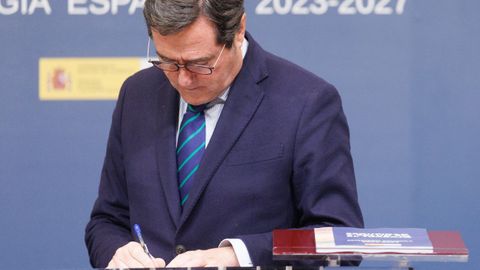
Author: Eduardo Parra | EUROPAPRESS
The employer advocates a salary increase based on criteria of productivity, absenteeism or variable formulas such as those that already exist
After five days of silence, The CEOE already has its verdict on the salary increase proposal presented by the trade unions: will not accept their offer of increase a 13.25% salaries of more than ten million workers who could be covered by the agreement during the period 2022-2024. the same way, refuse in the new Agreement on Employment and Collective Bargaining (AENC) emphatically include revision clauses that compensate workers for damages in the event that prices rise more than wages, sources from the employer confirmed for this newspaper.
During the morning of this Monday, an internal and “discreet” meeting of the employers’ committee in charge of labor affairs was held to evaluate the recent offer sent by the unions last Wednesday and there were no deviations: all members unanimously rejected UGT and CC OO demand a retroactive increase in workers’ wages by 5% until 2022.something they understand is complete “wild”Therefore, they believe that the union’s strategy is to negotiate.
“Companies, they already are closed fiscal year, they can’t factor in a 5% wage increase for their entire workforce because it goes directly into the profit and loss. They cannot afford it,” an employer who attended the meeting told this newspaper. Namely, last year, despite the absence of a collective agreement, unions and employers managed to agree a total of 3,084 contracts that protected more than nine million workers who achieved an average wage increase of 2.78 percent. According to the union’s proposal, this would mean that these employees should receive compensation of an additional 2.2 percent.
CEOE is ready to agree guidelines for salary increases for 2023 and 2024. And they are even considering including 2025 in the pact to make it a a full three-year periodIn addition, in the expectation that in that year the prices are moderate and the loss of purchasing power can be compensated. However, business people opt not so much for a fixed and closed percentage, but rather for a hairpin or “to” number. These newspapers, on the other hand, denied that the increases they are requesting of 4.5% for 2023 and 3.75% for 2024 are very high, also compared to the 2.9% that are currently being signed. Similarly, the opposition of businessmen to introduce clauses that protect the purchasing power of workers the price fluctuation was resounding, as they had already condemned last year, because it was a major stumbling block that caused the pact to explode in May 2022. “unacceptable” a new formula devised by the unions, which proposes mixed guarantee clauses that are not only linked to inflation but also to business profits. To do this, they intend to create a new indicator that is fed by data on the company’s sales and profits provided by the intersection of the Tax Administration and the Social Security, namely the one that determines the additional compensation. “That complicated formula of the second section, which is based on an algorithm that none of us understood, was not liked at all,” explained the employers’ association, who wonder why productivity must be calculated with a new indicator when “there is already an objective index published by INE”.
Term for negotiation
However, CEOE wants to make it clear that they are not closed to the recovery of workers’ purchasing power, but rather opt for additional increment which can be based on criteria such as productivityhe absenteeism from work or variable formulas with objective data that already exists today and does not need to be created. That’s why employers will sit down with the unions on March 13, with a good deal counter demand to discuss how to articulate or at least argue on paper why they cannot accept this new collective agreement offer.
What they did not like at all was the union’s order that either there be an agreement before May 1 or they ask the Government to take measures and raise Profit tax from 15% to 20%.
Source: La Vozde Galicia
I am Jason Root, author with 24 Instant News. I specialize in the Economy section, and have been writing for this sector for the past three years. My work focuses on the latest economic developments around the world and how these developments impact businesses and people’s lives. I also write about current trends in economics, business strategies and investments.







